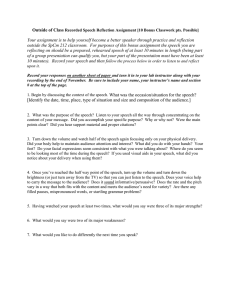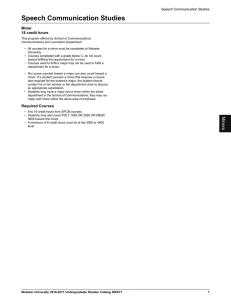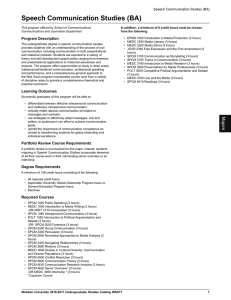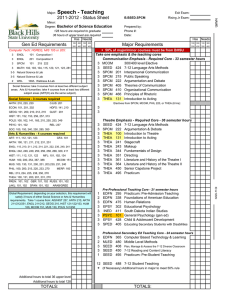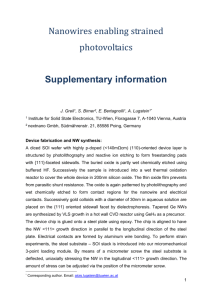SPCM - Speech Communications SPCM 1040 Public Speaking (3)
advertisement
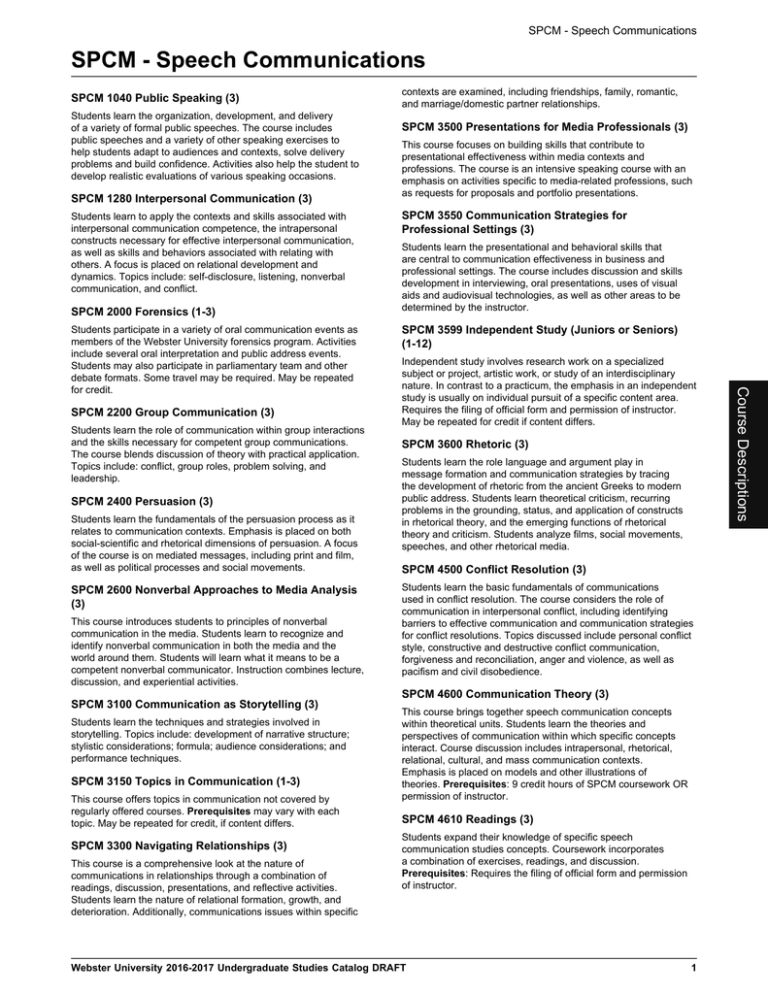
SPCM - Speech Communications SPCM - Speech Communications SPCM 1040 Public Speaking (3) Students learn the organization, development, and delivery of a variety of formal public speeches. The course includes public speeches and a variety of other speaking exercises to help students adapt to audiences and contexts, solve delivery problems and build confidence. Activities also help the student to develop realistic evaluations of various speaking occasions. SPCM 1280 Interpersonal Communication (3) Students learn to apply the contexts and skills associated with interpersonal communication competence, the intrapersonal constructs necessary for effective interpersonal communication, as well as skills and behaviors associated with relating with others. A focus is placed on relational development and dynamics. Topics include: self-disclosure, listening, nonverbal communication, and conflict. SPCM 2000 Forensics (1-3) SPCM 2200 Group Communication (3) Students learn the role of communication within group interactions and the skills necessary for competent group communications. The course blends discussion of theory with practical application. Topics include: conflict, group roles, problem solving, and leadership. SPCM 2400 Persuasion (3) Students learn the fundamentals of the persuasion process as it relates to communication contexts. Emphasis is placed on both social-scientific and rhetorical dimensions of persuasion. A focus of the course is on mediated messages, including print and film, as well as political processes and social movements. SPCM 2600 Nonverbal Approaches to Media Analysis (3) This course introduces students to principles of nonverbal communication in the media. Students learn to recognize and identify nonverbal communication in both the media and the world around them. Students will learn what it means to be a competent nonverbal communicator. Instruction combines lecture, discussion, and experiential activities. SPCM 3100 Communication as Storytelling (3) Students learn the techniques and strategies involved in storytelling. Topics include: development of narrative structure; stylistic considerations; formula; audience considerations; and performance techniques. SPCM 3150 Topics in Communication (1-3) This course offers topics in communication not covered by regularly offered courses. Prerequisites may vary with each topic. May be repeated for credit, if content differs. SPCM 3300 Navigating Relationships (3) This course is a comprehensive look at the nature of communications in relationships through a combination of readings, discussion, presentations, and reflective activities. Students learn the nature of relational formation, growth, and deterioration. Additionally, communications issues within specific SPCM 3500 Presentations for Media Professionals (3) This course focuses on building skills that contribute to presentational effectiveness within media contexts and professions. The course is an intensive speaking course with an emphasis on activities specific to media-related professions, such as requests for proposals and portfolio presentations. SPCM 3550 Communication Strategies for Professional Settings (3) Students learn the presentational and behavioral skills that are central to communication effectiveness in business and professional settings. The course includes discussion and skills development in interviewing, oral presentations, uses of visual aids and audiovisual technologies, as well as other areas to be determined by the instructor. SPCM 3599 Independent Study (Juniors or Seniors) (1-12) Independent study involves research work on a specialized subject or project, artistic work, or study of an interdisciplinary nature. In contrast to a practicum, the emphasis in an independent study is usually on individual pursuit of a specific content area. Requires the filing of official form and permission of instructor. May be repeated for credit if content differs. SPCM 3600 Rhetoric (3) Students learn the role language and argument play in message formation and communication strategies by tracing the development of rhetoric from the ancient Greeks to modern public address. Students learn theoretical criticism, recurring problems in the grounding, status, and application of constructs in rhetorical theory, and the emerging functions of rhetorical theory and criticism. Students analyze films, social movements, speeches, and other rhetorical media. SPCM 4500 Conflict Resolution (3) Students learn the basic fundamentals of communications used in conflict resolution. The course considers the role of communication in interpersonal conflict, including identifying barriers to effective communication and communication strategies for conflict resolutions. Topics discussed include personal conflict style, constructive and destructive conflict communication, forgiveness and reconciliation, anger and violence, as well as pacifism and civil disobedience. SPCM 4600 Communication Theory (3) This course brings together speech communication concepts within theoretical units. Students learn the theories and perspectives of communication within which specific concepts interact. Course discussion includes intrapersonal, rhetorical, relational, cultural, and mass communication contexts. Emphasis is placed on models and other illustrations of theories. Prerequisites: 9 credit hours of SPCM coursework OR permission of instructor. SPCM 4610 Readings (3) Students expand their knowledge of specific speech communication studies concepts. Coursework incorporates a combination of exercises, readings, and discussion. Prerequisites: Requires the filing of official form and permission of instructor. Webster University 2016-2017 Undergraduate Studies Catalog DRAFT 1 Course Descriptions Students participate in a variety of oral communication events as members of the Webster University forensics program. Activities include several oral interpretation and public address events. Students may also participate in parliamentary team and other debate formats. Some travel may be required. May be repeated for credit. contexts are examined, including friendships, family, romantic, and marriage/domestic partner relationships. SPCM - Speech Communications SPCM - Speech Communications SPCM 4616 Communication Research and Analysis (3) Focuses on systematic analyses of communication contexts and events. Using communication models and research methodologies, students learn about a variety of communications, including group communications, speeches and debates, and culture. Prerequisite: 6 hours of SPCM coursework OR permission of the instructor. SPCM 4620 Senior Overview (3) Students complete an original speech communication studies project that reflects an understanding and application of principles related to the student's area of emphasis. Projects may vary from campaigns to original research. Additionally, applications of oral communication principles are made through the analysis and discussion of case studies. Prerequisites: Requires the filing of official form, senior standing AND permission of the instructor. 2 Webster University 2016-2017 Undergraduate Studies Catalog DRAFT
